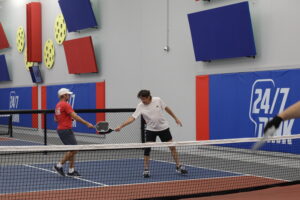Pickleball — a fast-growing sport that blends elements of tennis, badminton, and ping pong — has taken the world by storm. What began as a backyard pastime in the 1960s is now one of the most popular recreational activities for people of all ages. Beyond its fun and social appeal, pickleball offers a wide range of health, mental, and social benefits.
1. A Great Full-Body Workout
Despite its small court size and lightweight paddle, pickleball provides a surprisingly effective workout. Players engage multiple muscle groups through quick lateral movements, dashes to the net, and controlled swings. It improves cardiovascular endurance, agility, and hand-eye coordination — all while being easier on the joints than sports like tennis or running.
2. Low-Impact and Easy on the Joints
One of pickleball’s biggest draws is its accessibility. The smaller court means less running and fewer high-impact movements, making it ideal for older adults or anyone recovering from joint issues. The game’s slower pace (compared to tennis) reduces stress on knees, hips, and ankles while still offering a solid aerobic workout.
3. Improves Mental Sharpness and Focus
Pickleball isn’t just physical — it’s strategic. Players must think on their feet, anticipate opponents’ moves, and adjust their positioning quickly. This mental engagement can help improve cognitive function, concentration, and decision-making skills. Research has also shown that learning new physical skills, like pickleball, supports brain health and slows cognitive decline.
4. Boosts Mood and Reduces Stress
Exercise is a proven mood booster, and pickleball is no exception. The combination of physical activity and friendly competition triggers the release of endorphins — the body’s natural “feel-good” chemicals. Whether you’re playing casually or competitively, it’s hard not to leave the court smiling.
5. Social Connection and Community
Perhaps the most unique benefit of pickleball is its social nature. Games are usually played in doubles, encouraging teamwork and friendly interaction. Pickleball clubs and community courts are popping up everywhere, fostering connections across generations. Many players say they’ve built lasting friendships through the sport — a crucial factor in mental and emotional well-being.
6. Accessible for All Ages and Skill Levels
Pickleball’s simple rules and easy learning curve make it welcoming for beginners, while still offering depth and challenge for more advanced players. Children, adults, and seniors can all play together, making it a rare sport that bridges generations.
7. Supports Healthy Aging
For older adults, pickleball is particularly beneficial. It improves balance, coordination, and flexibility — helping prevent falls and injuries. The combination of physical activity and social engagement also contributes to better heart health and longevity.
8. A Gateway to a More Active Lifestyle
Many people who struggle to stick with traditional workouts find pickleball to be an enjoyable alternative. Because it feels more like play than exercise, it encourages consistent participation — and consistency is key to long-term health benefits.
Final Thoughts
Pickleball is more than a passing fad — it’s a fun, inclusive, and health-promoting activity that anyone can enjoy. Whether you’re looking to stay fit, meet new people, or simply have fun, this paddle sport offers something for everyone. So grab a paddle, hit the court, and see why so many people are falling in love with the game.


